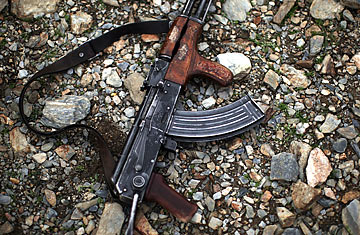
A well-worn Kalashnikov automatic rifle sits on the ground near Mangow in Nuristan province, Afghanistan
The reliable measure of stability in many countries is the value of the currency or the price of equities, bread or fuel — but not in Afghanistan: here the key indicator that nearly every Afghan keeps tabs on is the price of a Kalashnikov AK-47 assault rifle. And the bad news is that the market is bullish. The stepped-up Taliban offensive and mounting discord over the outcome of last month's election have seen the price of a Chinese-made AK smuggled in from Pakistan rise to $400 from $150 in just three months. "People are arming themselves," a Western official in Kabul noted with alarm.
The surge in the Kalashnikov Index is likely to be sustained by the results of the Aug. 20 elections, widely perceived by Afghans, diplomats and foreign observers as marred by fraud. Fictitious polling booths were set up, and in some places, vote riggers were so brazen they did not even bother to remove the individual ballots from the booklets in which they were printed before marking them.
Most of the rigging favored the incumbent, President Hamid Karzai, and political uncertainty is rising over how the opposition — notably his leading rival, former Foreign Minister Dr. Abdullah Abdullah, and the powerful coterie of Tajik warlords he represents — will react to Karzai's flawed victory. In Kabul on Wednesday, the streets were empty, since many residents thought that Abdullah's supporters might take advantage of the holiday honoring the death of the legendary Tajik warrior Ahmed Shah Massoud to launch protests. Massoud had fought against the Soviets and then against the Taliban before his assassination by al-Qaeda in 2001. Fortunately, this week the city has stayed calm.
The latest tally, with more than 92% of ballots counted, gives Kazai 54% of the vote, well above the 50% threshold required to avoid a runoff. But U.N. officials monitoring the election process have confided to diplomats that if all the fraudulent votes were discarded, Karzai's total would sink below 50%, forcing him to face Abdullah in a runoff. Diplomats say the West is divided over what to do next: ignore the fraud and give Karzai his tainted triumph in the interests of stability, or subject Afghans to another round of balloting, with all the potential for escalating political turbulence, that would probably result in a Karzai win anyway.
Despite the obstacles, many international sponsors, including the Americans, say privately that they want to see Karzai face a runoff, as a way of restoring the fairness of the elections. A second round, they argue, might clip Karzai's wings and make him more responsive to Western demands that he dismiss corrupt officials and mischiefmaking warlords. But in reality, a second round is a near impossibility. Weeks from now, craggy northern Afghanistan will be blanketed in snow. The earliest that a second-stage vote could be plausibly be organized is next spring, dooming Afghans to months of political turmoil. And Karzai may not play along. Says Haroun Mir, director of Afghanistan's Center for Research and Policy Studies: "Karzai's not feeling very conciliatory. He thinks that despite efforts by the international community to undermine him, he's the victor."
Friends describe the President as isolated, except for an entourage of flatterers, in his gloomy Arg palace, the scene of many past assassinations. They say Karzai remains decent and well-intentioned but that he is swamped by trying to micromanage this chaotic country.
In keeping with an Afghan tradition of settling disputes by redividing the spoils, Karzai has sent out feelers to Abdullah, hoping to end the standoff by wooing him into joining the next government. So far, Abdullah has rebuffed Karzai, but observers believe the opposition candidate may eventually name his price as regaining his old job as Foreign Minister. (Karzai reportedly fired Abdullah from the post on the grounds that he was reserving plum ambassadorial posts for fellow Tajiks.) Abdullah's powerful backers, the northern warlords among them, will also want key Cabinet posts, such as Interior and Defense.
The power-sharing option presents Karzai with a quandary, however: many of the seats in his future Cabinet are already promised to the regional power barons and warlords who helped him carry the election. Karzai's penchant for promising too much to too many also riles Western donors. They want to see Karzai's government operating competently and delivering services and development, rather than turned into a feeding trough for those he owes favors. As Ashraf Ghani, an ex–Finance Minister who ran against Karzai in the presidential race, told TIME, "You can say that 5% patronage is O.K., but not 95%, as it is now." Whether the West and many Afghans like it or not, they are very likely to be stuck with Karzai for the next five years. And meanwhile, the price of a Kalashnikov is rising.
